Be Prepared, Not Scared – Scams Are Everywhere!
Preface
Today we received an email from an individual who lost a great deal of money and a lot of critical personal information to a scammer. This person received a phone call and then allowed the caller to connect to his computer.
Every week we get at least one email from someone who was scammed out of money or personal information or both. We don’t want you to become a victim. We are here to help you and keep you informed. We hope you’ll read this entire article and look at the screenshots shown. Whether you get a phone call out of the blue, or get a pop-up telling you that your computer is infected with all manner of bad things, TH!INK before you act. Phone calls from scammers claiming to be from your bank or government agency or who discovered somehow your computer is infected happen all the time.
We want you to be prepared so you won’t be scared and panic.
We’re going to show some scam pop-ups. These pop-ups change in appearance frequently but the methodology is always the same – go get you ta take action – the wrong action – and you’ll be a victim too if you’re not careful.
BE PREPARED, NOT SCARED!
FIRST NO LEGITIMATE COMPANY IS GOING CALL YOU OUT OF THE CLEAR BLUE SKY AND ASK YOU TO ALLOW THEM TO CONNECT TO YOUR COMPUTER TO “CLEAN IT”, REMOVE “MALWARE” “VIRUSES” OR OTHERWISE “FIX IT”. NOT EVER. NEVER. NEVER.
In this article, we’re going to explain how these scams work, how to get rid of them if you see them, and show you some examples so you will recognize them when you see them. And if you spend enough time on the Web, you will see one of these scams.
Whether it’s a Microsoft support scam or any tech support scam, you need to know these kinds of scams abound- and sooner or later, you’re probably going to run into one.
We receive emails each week from folks who encounter these kinds of scams and are convinced their security software has let them down now they’re infected. But it’s not true. Most of these support scams are carefully crafted advertisements cunningly created to make them appear to be warnings coming from your own computer or Microsoft.
Because it seems these tech support scams are back in full vigor, we hope you’ll read this article, and look that the images here, so that you’ll know, right away, when you’ve encountered one of these tech support scams. Remember: The actual warning you see may look a bit different [the most popular tech scam going around at the time of this writing is what we call the “You-have-been-infected-with-the-XXXX-Virus” scam.
Whatever the virus of the day is supposed to be, the name whatever the name is it will be terrifyingly awful sounding. But stay calm. It’s a fake
In the past, many people who have run into the Tech Support or Microsoft Tech Support Scam have been contacted by scammers and warned by telephone that their computers are infected or compromised.
But it seems now, the fake “your computer is infected with **whatever the name of the nonexistent virus/Trojan is ** or the ** your computer has been compromised and your personal information is at risk** – or the even scarier **If you don’t click this – all the data on your hard drive will be erased* popups that appear, seemingly out of nowhere, when browsing the web. Many appear to be coming from your own computer.
All of these fake “Your computer is infected”, “Your computer is compromised” or other dire warnings that pop up out of nowhere, are popups ads. They’re not viruses, Trojans, or malware. They’re ads that try to trick you into calling a phone number for support. They’re scams.
And regardless of how many times the scam popups mention Microsoft or show the Microsoft logo, or how many times the ads refer to “Certified Microsoft Technicians” there’s a 100% certainty that they’re scams.
We have warned our readers about scams many times, but we are once again seeing more and more people losing a great deal of money to these criminals… and many times they’re being tricked because they see the Microsoft logo or Certified Microsoft Technicians on the fake warning, and that convinces them the warning is legitimate and they let down their guard and call the phone number and then allow the crooks access to their PC.
Please remember this!
Microsoft nor any other legitimate company or organization is going to call you or show you a popup warning you that your computer is infected or compromised. Microsoft is never going to show you a popup with a telephone number and urge you to call Microsoft Support to fix or clean your PC. Never. Not today. Not tomorrow. Not ever.
No legitimate security software is ever going to tell you that your files are going to be deleted if you close a dialog or window… or tell you to call a phone number. Not even the worst legitimate security software would do that. Not today, not tomorrow, not ever.
BE PREPARED, NOT SCARED
For this article, we’ve collected some of these fake warning popups, and we posted them at the bottom of this article. Keep in mind, these are just a very few of the many variations of scam popups out there… there are hundreds of them. Some have different wording, and slightly different colors and some look more realistic than others, but they all have the same mission: To get you to call a number so they “fix” the non-existent virus infections, computer problems, or errors.
People who do call will be told that the “technician” needs to connect to their PC so they can run special scans. The scans, of course, are fake and always turn up dozens, sometimes hundreds of infections, errors, and problems. Not to worry, they’ll tell the victim… they all can be fixed… for a price. We have heard from people who have been bilked out of hundreds of dollars. One person who wrote us recently lost $1000 on this kind of scam.
There’s a version of the support scam or Microsoft Tech Support Popup Scam, where the victim calls a phone number and the technician runs the fake scan or scans, then tells them what’s wrong (all fake) then tells them they need to buy a couple of hundred dollars worth software programs to clean, fix and protect their computer and their privacy. Of course, they’ll want your credit card number – would you actually give your credit card number to a criminal? No, of course not. But because people think they’re dealing with Microsoft, they do give out their credit card numbers and lose hundreds of dollars to scammers.
Please do not fall for these kinds of scams. If you should see a warning that your hard drive will be wiped if you close your browser, that is not true.
BE PREPARED… NOT SCARED!
When you see one of these fake popup alerts or warnings, Here’s what you need to do:
1.) Use CTRL + F4 to close the offending browser tab (Press the CTRL key and the F4 key on the top row of your keyboard).
And…if that does not work…
2.) Press ALT + F4 to close all open browser tabs.
And…if that does not work…
3.) Open Task Manager by pressing the CTRL+SHIFT+ESC keys. In Task Manager, click on the “Processes” tab at the top. In the list of processes, right-click on each instance of the browser you see running and choose “end task”. Note: Google Chrome usually shows a process for every tab open and every Chrome extension running. You’ll need close as many of these as necessary until you see the browser window with the scam in it close. Browser processes for the most popular browsers show as chrome.exe, firefox.exe, and Microsoft Edge.
And if you still can’t get the scam advertisement(s) closed:
4.) Press and hold down the Windows key and tap the R key. Type SHUTDOWN /R in the Run box and press Enter. This will restart your computer and close all open programs.
Make sure when you restart your browser or your computer when your browser asks if you want to restore the open tabs, you want to decline – otherwise, there’s a good chance you’ll find yourself right back where you started with the scam popup.
If you’re prepared, you won’t panic. When you panic it’s hard to think straight. So…
BE PREPARED – NOT SCARED.
We want you to be safe. Don’t be tricked by these sophisticated thieves and con artists. Remember what you read here and remember what you saw here. Be wary – not paranoid. Don’t panic. Think. And remember:
Microsoft nor any other legitimate company or organization is ever going to show you a popup warning you that your computer is infected or compromised. Microsoft nor any other legitimate company is ever going to show you a popup with a telephone number and urge you to call Microsoft Support to fix or clean your PC. Never. Not today. Not tomorrow. Not ever.
As promised, here are some screenshots of a few of these scam popups. Remember: These are only a few of the hundreds of different scam popups out there – but most tech support scams use the same basic techniques to get you to call a phone number for help. All the references to Microsoft are just to lure you into trusting the scammer. Microsoft has nothing to do with any of these scams.
BE PREPARED – NOT SCARED!
SOME SAMPLES OF WHAT THESE KINDS OF SCAMS LOOK LIKE – THEY MAY LOOK REAL BUT THEY ARE ALL SCAM ADVERTISEMENTS FOR FAKE TECH SUPPORT OR MICROSOFT SUPPORT SCAMS. THEY MAY APPEAR TO BE COMING FROM YOUR OWN COMPUTER – THEY ARE NOT. THEY ARE COMING FROM THE WEB.
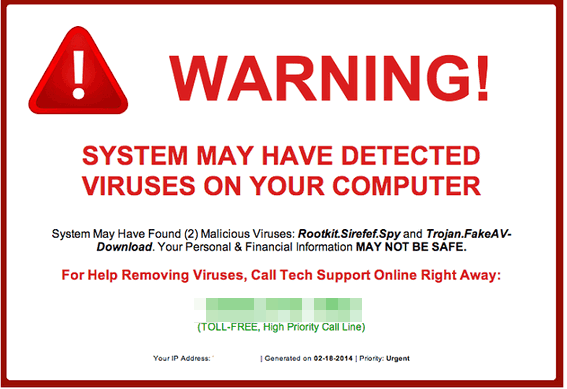
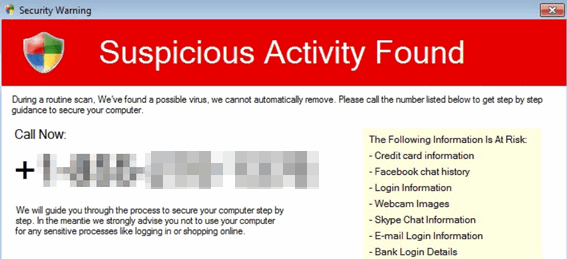
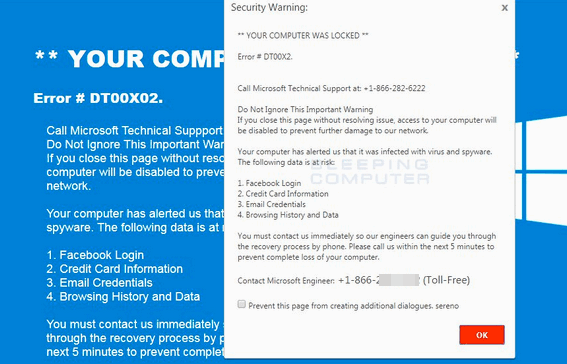
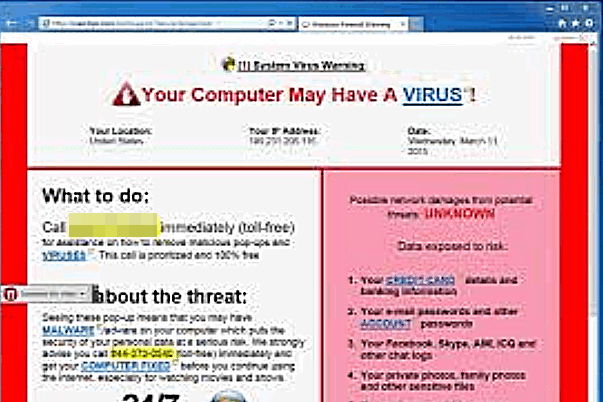
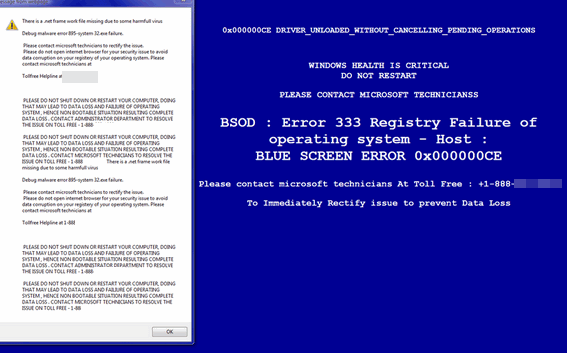
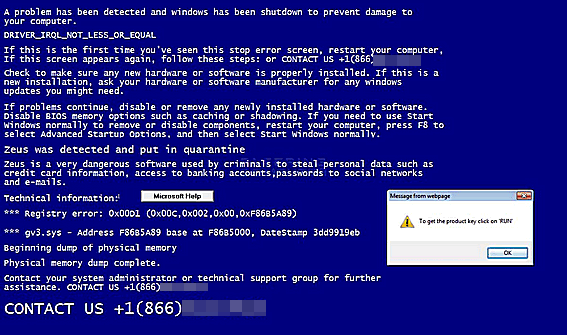
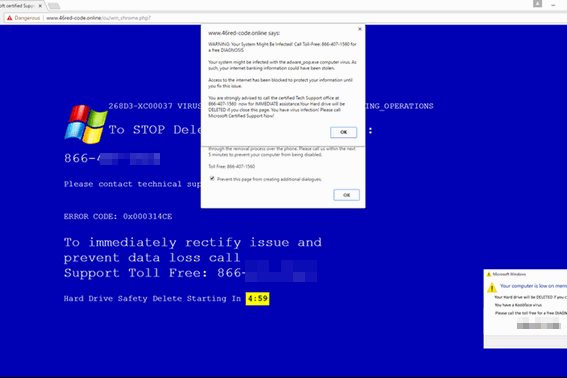
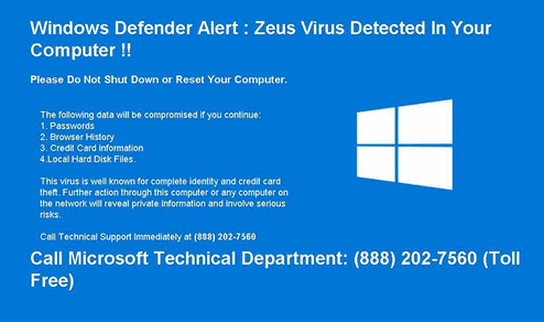
All of the images above look authentic … very real. Their messages vary; most are dire. But… they are ALL SCAMS, folks.
Here are some more images and they are all scams too.
Forewarned is forearmed. Commit these images to memory so if/when you encounter one similar to these you’ll know exactly what to do.
BE PREPARED – NOT SCARED!
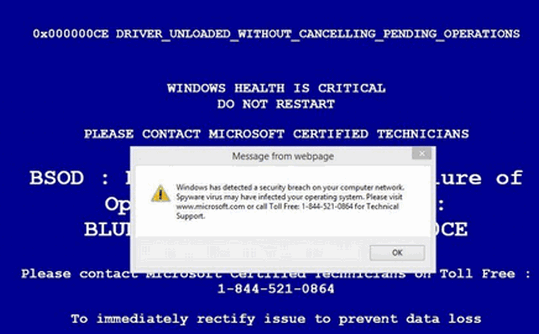
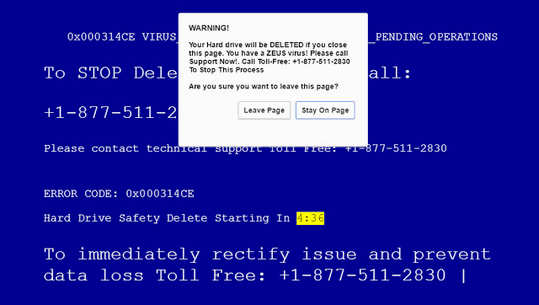
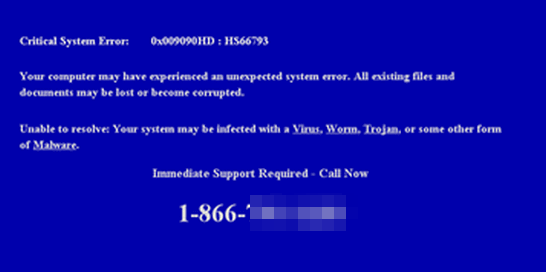
Oh my! My data is going to be lost or corrupted if I don’t call that number! Woe is me. NO! Not woe is me. It’s just a tech support scam.
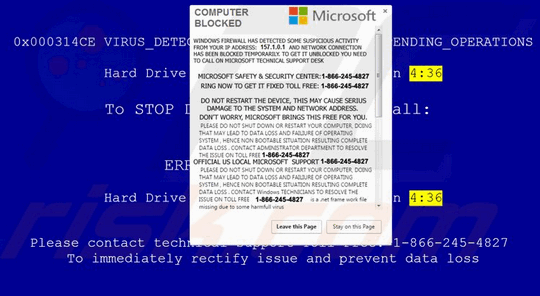
Above: Another scam. This one is verbose. All kinds of dire warnings and not-so-veiled threats in this one. But it’s just a scam. It’s a scam I tells ya!
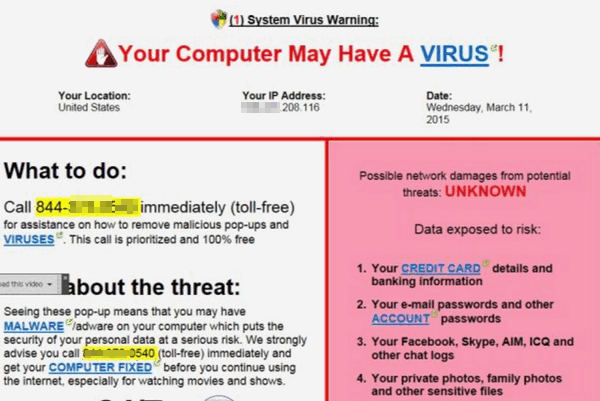
Above: Note the dire warnings that your bank account and credit card details are at risk. In this case, they’re not lying. They are very at risk if you fall for this scam. As you can see they add your IP address and the date to make it look official. That’s easy to do. This scam has been making the rounds for years.
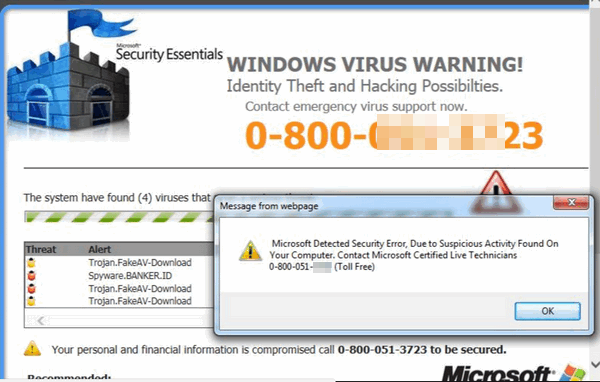
Above… don’t let all the Microsoft logos and “Microsoft Certified Live Technicians” trick you. This is all a scam and it’s not coming from your computer. Notice at the top of the warning it says “Message from webpage”. A dead giveaway that this scam did not come from your PC, but from the Internet. Plus, if you’re not using Microsoft Security Essentials… DUH! You should immediately recognize this as a scam.
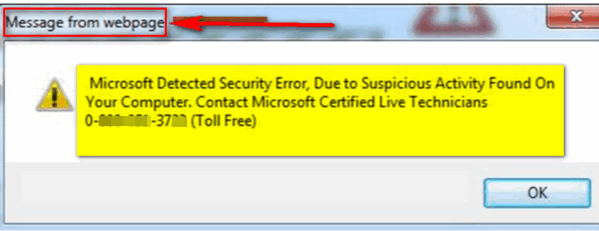
Above: The scam up close. Notice “Message from webpage”. That tells you that this popup did not come from your PC, but it’s just a popup ad from a web page. Notice they don’t use “Microsoft technicians”, but “Microsoft Certified Live Technicians”. What else would they say, dead Microsoft technicians? They’re not technicians at all – they’re thieves, miscreants, and criminals out to get your money.

Another “Microsoft” alert. It’s not from Microsoft, it’s not from your PC. It’s just a web page popup ad. Again we have the “Microsoft Certified Live Technicians” back for an encore. When will they start using dead technicians? Live or dead, this is just another scam.
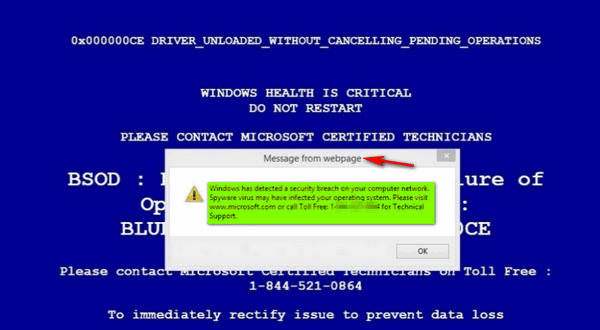
Above: Are you getting the idea that there are an endless number of scams out there trying to trick you and steal your money? There are. We’re here to expose these crooks. Don’t let them fool you.
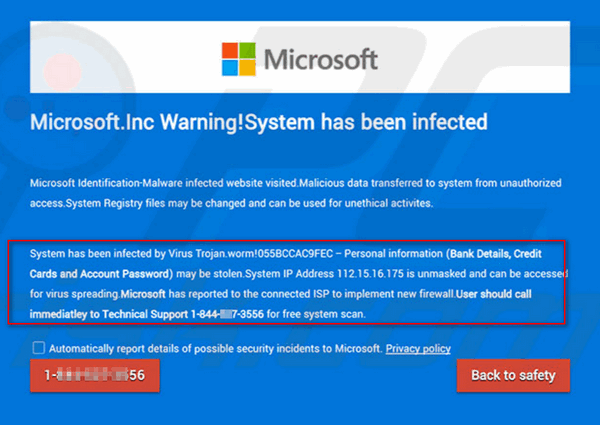
Above: A very real-looking scam pop-up, with the Microsoft logo at the top and Microsoft referenced in the body. Showing your IP address may scare some people, but your IP address is visible to every website you visit. Want to see it? Your IP is part of the details your browser always shows automatically. See https://www.whatsmybrowser.org/ and https://www.showmyip.com/.
Clicking the “Back to safety” button (above) leads you to another scam, and calling the number posted would lead you right tin o the nest of criminals that want to steal your money. It’s just another scam designed to trick you into giving up your money.
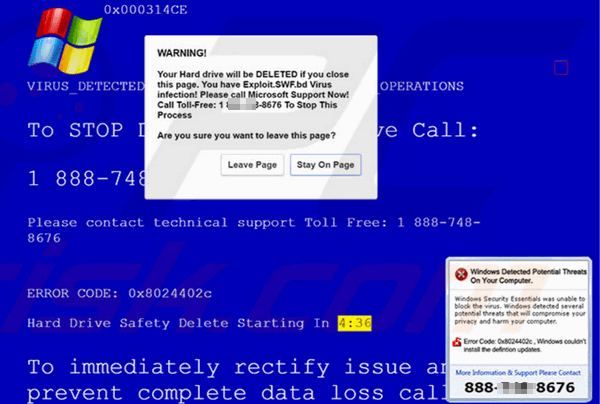
Above: Another scam with a bit of drama. It’s going to delete your hard drive contents if you close this page. However, if you close the page, the only thing that will happen is you’ll be getting away from the den of thieves behind this scam. Notice that this one tells you to call “Microsoft Support Now!” and gives you a toll-free number. But, trust us, if you do call that number, you won’t be talking to Microsoft or even a technician, but you will be talking one on one with a real, live con artist.
See the close-up below. Woe is you! They’re going to delete your hard drive’s contents if you close this page. However, that will not happen. If you close this page, the criminals will just lose a potential victim.
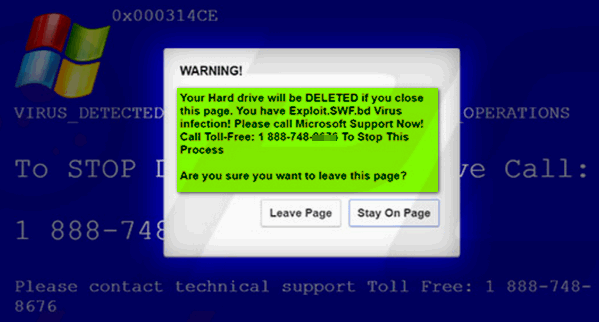
The one below is not as common these days, but it’s still making the rounds. This one’s warning tells you you’ve got a rootkit Trojan! With the scary name of ROOTKIT_TROJAN_HIJACK.EXE. Wow! They have all the keywords that should send shivers down the spine of most users, but not you! By now, you know better, right? And notice the Microsoft references. This one has been around for a long time. The name of the Trojan changes, but not the scam… it’s the same old, same old.
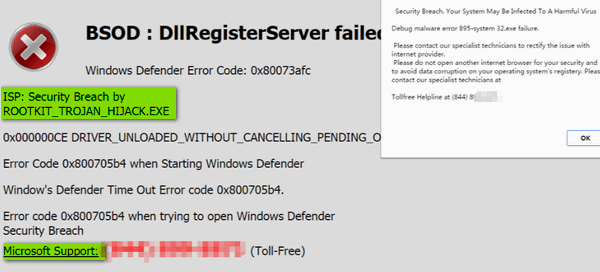
Just one more. Take a look at the image below. This scam makes it looks like your computer was scanned and lots of malware and bad stuff was found lurking on your PC. Looks like you better call and get it off or your PC will explode and your privacy will go up in a cloud of smoke (no pun intended). Notice the Microsoft logo at the bottom and the Microsoft Security Essentials logo at the top. No one using Windows 10 or Windows 11 could be using Microsoft Security Essentials, so you should NEVER be fooled by this one. And no matter what, you should recognize this as a scam, if for no other reason than the theatrical way they try to get you to call “Tech Support”.
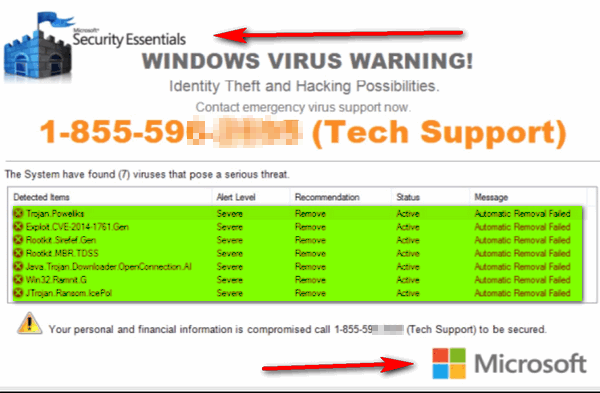
There are hundreds of these kinds of scams out there just waiting to trick you.
They may all look slightly different, but they all have the same goal… to get you to scare you and make you believe that your computer is compromised or infected – and scare you into calling a number to get your PC fixed. These are scams no matter how many Microsoft logos you see or how many times they use “Microsoft Certified Technicians”. They are scams if they show you a phone number to call, Microsoft or not. They are scams when they tell you if you close the window you’ll lose all your data.
These criminals want you to call the number shown on the warning so they can run fake scans, that show you how badly your computer is infected, and tell you that even though your PC is very badly infected or compromised, don’t you worry – they can fix you right up for a price. DON’T CALL IN THE FIRST PLACE. DON’T PAY. Do not give your credit card or checking account information to them. Never give any information to anyone who calls you unexpectedly claiming to be from Microsoft, your bank, a government agency, or anyone else.
If you have fallen for a scam like the ones above, call your credit or debit card company or your bank immediately and tell them you’ve been scammed. Don’t be embarrassed to admit it. Millions and millions of people are tricked by scams every month.
Our mission is to help keep you safe.
We hope this helps article will help you to recognize a scam if and when you see one.
AND REMEBER…NO LEGITIMATE COMPANY IS GOING TO CALL YOU OUT OF THE CLEAR BLUE SKY AND ASK YOU TO ALLOW THEM TO CONNECT TO YOUR COMPUTER TO “CLEAN IT”, REMOVE “MALWARE” “VIRUSES” OR OTHERWISE “FIX IT”. NOT EVER. NEVER. NEVER.
This stuff is real and happens all the time. We know people who have lost thousands of dollars and people who have spent hundreds of hours trying to recover from identity theft and financial loss. Please don’t let it be you.
Be safe! Not Sorry. Be prepared…not scared!

Have yourself a very Merry Christmas and a healthy, safe, and Happy New Year!


Many, many thanks for sending out this “how to” to get away from one of these Scams. I’ve copied down your instructions on how to get rid of these should I ever get one of these deadly pop-ups and now feel much more secure.
Good advice – especially this time of year when I think lot of us ‘seniors’ may be more trusting and tend to ‘let our guard down’ ! I think telephone scams are particularly harmful when your partner is not computer ‘savy’ and they take one of these calls that sound so convincing that they come from a ‘legitimate’ source !
Have a safe , Happy Christmas, and hope the new year will be Healthy and Prosperous for you !
David David
This happened to me in July and I paid them, they said I was given a 2 year contract. Then they tried phoning me again several weeks ago it took my forever to get them off the phone, have now blocked there phone number but am worried they might try to get more money from my bank, any suggestions. I finally realized it was a scam. Thank you!